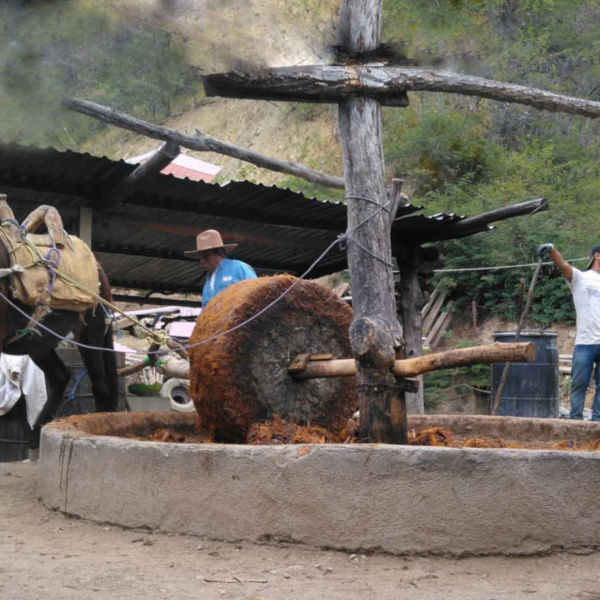Working donkeys play a crucial role in supporting rural and impoverished communities across Mexico where they are often a family’s key source of income, according to recent research by international animal welfare charity, The Donkey Sanctuary.
However, these animals can suffer from welfare problems, such as open wounds or lameness and so the charity teamed up with the UK’s University of Portsmouth to assess the welfare of working donkeys, mules and horses in the Mexican states of Puebla, Queretaro and Veracruz.
The subsequent study found that in these rural, lower and middle-income Mexican communities, working animals labour in often harsh and challenging climates to provide a crucial, stable income for their owners.
More than 100 of the 120 equids assessed presented some type of skin alteration, comprising open wounds, scarring and swellings. Others showed visual signs of lameness and overgrown or cracked hooves.
More than 60% of the equids assessed were used as riding or pack animals, while a small proportion were involved with agroforestry, which combines farming and forestry.
Overall, the equids were found to suffer from welfare problems associated with the local economic and climatic conditions. Mules worked the longest hours and the most days compared to other equids - up to nine hours per day and sometimes seven days a week. Most of those assessed had limited access to shade or water during work periods in both dry and humid conditions.
Dr Faith Burden, Executive Director or Equine Operations at The Donkey Sanctuary said: “This research was really important because it has helped us to understand the welfare problems faced by working equids in this part of the world.
“If we want to improve the welfare of working equids, we must first understand what problems they face, and some of the issues that contribute to poor welfare, before we can take positive action.”
Dr Burden added: “It is important donkey owners can spot signs of injury, fatigue and other problems to ensure their animals’ welfare needs are met, and so they can continue to work and support livelihoods.
“Results such as those gathered in this study help us to identify some of the equid-care practices within local communities, so that we can deliver education to change human attitudes and behaviours to improve equid welfare.”
The research found that welfare varied by region and community. Poorer overall body condition was found in equines working in Puebla, for example, in comparison to Quertetaro and Veracruz, with little difference between welfare in the latter two states.
Across the study, donkeys tended to be used mostly for domestic tasks helping women and less frequently for income generation. This seems to reduce their value compared to mules and horses, which may in turn result in lower levels of care for donkeys.
Dr Burden said: “Reasons for poor welfare may be linked to community animal care, knowledge and practice as well as socio economic constraints and climatic factors. Overall the study has highlighted that Puebla in particular could benefit from targeted welfare improvement interventions.”
Mexico is currently classified by the World Bank as an upper-middle income country and contains an estimated 12.9 million working equids. These working animals are key to farming and rural livelihoods and are often working in the less prosperous regions of the country.
There is a heavy reliance on non-commercial, family farming and in the hills of central Mexico, 90% of households rely on draught animals for agricultural production and over 50% of rural households keep a donkey.
The charity’s research paper, Comparison of working equid welfare across three regions of Mexico was published in The Equine Veterinary Journal, (Sept 2020) a peer-reviewed journal reporting on all aspects of equine veterinary medicine.
The article is available free through open access here.
The Donkey Sanctuary is a global leader for equine welfare, research and veterinary care. The charity operates programmes worldwide for animals working in agriculture, industry and transportation.
For interviews, images and information please contact The Donkey Sanctuary press office on 01395 573124 or 07870 849563 (including out of hours) or send an email.
The Donkey Sanctuary is the world's largest equine welfare charity. Our vision is a world where donkeys and mules live free from suffering and their contribution to humanity is fully valued. We run 10 sanctuaries around the UK and Europe, giving lifelong care to more than 7,000 donkeys and mules. Our hospital treats sick donkeys and trains vets both nationwide and worldwide. Our donkey-facilitated learning programme helps vulnerable children and adults develop life skills by connecting with donkeys on an emotional and physical level. The charity operates programmes worldwide for animals working in agriculture, industry and transportation, and those used in the production of meat and skin.
Please note that the name ‘The Donkey Sanctuary’ should not be abbreviated to ‘Donkey Sanctuary’, and the word ‘The’ should always appear with a capital ‘T’ as above.
